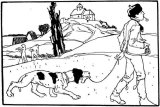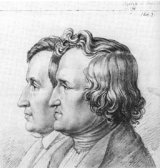Clever Hans
"Clever Hans" by The Brothers Grimm is an enchanting tale of a young man named Hans, who, despite his cleverness, constantly bungles his attempts to court his sweetheart Gretel due to his literal interpretation of her requests. The story is a series of humorous misadventures that showcase both his naive nature and unusual logic. It's an interesting mix of comedy, folklore, and life lessons.
The mother of Hans said: ‘Whither away, Hans?’ Hans answered: ‘To Gretel.’ ‘Behave well, Hans.’ ‘Oh, I’ll behave well. Goodbye, mother.’ ‘Goodbye, Hans.’ Hans comes to Gretel. ‘Good day, Gretel.’ ‘Good day, Hans. What do you bring that is good?’ ‘I bring nothing, I want to have something given me.’ Gretel presents Hans with a needle, Hans says: ‘Goodbye, Gretel.’ ‘Goodbye, Hans.’ Hans takes the needle, sticks it into a hay-cart, and follows the cart home. ‘Good evening, mother.’ ‘Good evening, Hans. Where have you been?’ ‘With Gretel.’ ‘What did you take her?’ ‘Took nothing; had something given me.’ ‘What did Gretel give you?’ ‘Gave me a needle.’ ‘Where is the needle, Hans?’ ‘Stuck in the hay-cart.’ ‘That was ill done, Hans. You should have stuck the needle in your sleeve.’ ‘Never mind, I’ll do better next time.’ ‘Whither away, Hans?’ ‘To Gretel, mother.’ ‘Behave well, Hans.’ ‘Oh, I’ll behave well. Goodbye, mother.’ ‘Goodbye, Hans.’ Hans comes to Gretel. ‘Good day, Gretel.’ ‘Good day, Hans. What do you bring that is good?’ ‘I bring nothing. I want to have something given to me.’ Gretel presents Hans with a knife. ‘Goodbye, Gretel.’ ‘Goodbye, Hans.’ Hans takes the knife, sticks it in his sleeve, and goes home. ‘Good evening, mother.’ ‘Good evening, Hans. Where have you been?’ ‘With Gretel.’ What did you take her?’ ‘Took her nothing, she gave me something.’ ‘What did Gretel give you?’ ‘Gave me a knife.’ ‘Where is the knife, Hans?’ ‘Stuck in my sleeve.’ ‘That’s ill done, Hans, you should have put the knife in your pocket.’ ‘Never mind, will do better next time.’ ‘Whither away, Hans?’ ‘To Gretel, mother.’ ‘Behave well, Hans.’ ‘Oh, I’ll behave well. Goodbye, mother.’ ‘Goodbye, Hans.’ Hans comes to Gretel. ‘Good day, Gretel.’ ‘Good day, Hans. What good thing do you bring?’ ‘I bring nothing, I want something given me.’ Gretel presents Hans with a young goat. ‘Goodbye, Gretel.’ ‘Goodbye, Hans.’ Hans takes the goat, ties its legs, and puts it in his pocket. When he gets home it is suffocated. ‘Good evening, mother.’ ‘Good evening, Hans. Where have you been?’ ‘With Gretel.’ ‘What did you take her?’ ‘Took nothing, she gave me something.’ ‘What did Gretel give you?’ ‘She gave me a goat.’ ‘Where is the goat, Hans?’ ‘Put it in my pocket.’ ‘That was ill done, Hans, you should have put a rope round the goat’s neck.’ ‘Never mind, will do better next time.’ ‘Whither away, Hans?’ ‘To Gretel, mother.’ ‘Behave well, Hans.’ ‘Oh, I’ll behave well. Goodbye, mother.’ ‘Goodbye, Hans.’ Hans comes to Gretel. ‘Good day, Gretel.’ ‘Good day, Hans. What good thing do you bring?’ ‘I bring nothing, I want something given me.’ Gretel presents Hans with a piece of bacon. ‘Goodbye, Gretel.’ ‘Goodbye, Hans.’ Hans takes the bacon, ties it to a rope, and drags it away behind him. The dogs come and devour the bacon. When he gets home, he has the rope in his hand, and there is no longer anything hanging on to it. ‘Good evening, mother.’ ‘Good evening, Hans. Where have you been?’ ‘With Gretel.’ ‘What did you take her?’ ‘I took her nothing, she gave me something.’ ‘What did Gretel give you?’ ‘Gave me a bit of bacon.’ ‘Where is the bacon, Hans?’ ‘I tied it to a rope, brought it home, dogs took it.’ ‘That was ill done, Hans, you should have carried the bacon on your head.’ ‘Never mind, will do better next time.’ ‘Whither away, Hans?’ ‘To Gretel, mother.’ ‘Behave well, Hans.’ ‘I’ll behave well. Goodbye, mother.’ ‘Goodbye, Hans.’ Hans comes to Gretel. ‘Good day, Gretel.’ ‘Good day, Hans, What good thing do you bring?’ ‘I bring nothing, but would have something given.’ Gretel presents Hans with a calf. ‘Goodbye, Gretel.’ ‘Goodbye, Hans.’ Hans takes the calf, puts it on his head, and the calf kicks his face. ‘Good evening, mother.’ ‘Good evening, Hans. Where have you been?’ ‘With Gretel.’ ‘What did you take her?’ ‘I took nothing, but had something given me.’ ‘What did Gretel give you?’ ‘A calf.’ ‘Where have you the calf, Hans?’ ‘I set it on my head and it kicked my face.’ ‘That was ill done, Hans, you should have led the calf, and put it in the stall.’ ‘Never mind, will do better next time.’ ‘Whither away, Hans?’ ‘To Gretel, mother.’ ‘Behave well, Hans.’ ‘I’ll behave well. Goodbye, mother.’ ‘Goodbye, Hans.’ Hans comes to Gretel. ‘Good day, Gretel.’ ‘Good day, Hans. What good thing do you bring?’ ‘I bring nothing, but would have something given.’ Gretel says to Hans: ‘I will go with you.’ Hans takes Gretel, ties her to a rope, leads her to the rack, and binds her fast. Then Hans goes to his mother. ‘Good evening, mother.’ ‘Good evening, Hans. Where have you been?’ ‘With Gretel.’ ‘What did you take her?’ ‘I took her nothing.’ ‘What did Gretel give you?’ ‘She gave me nothing, she came with me.’ ‘Where have you left Gretel?’ ‘I led her by the rope, tied her to the rack, and scattered some grass for her.’ ‘That was ill done, Hans, you should have cast friendly eyes on her.’ ‘Never mind, will do better.’ Hans went into the stable, cut out all the calves’ and sheep’s eyes, and threw them in Gretel’s face. Then Gretel became angry, tore herself loose and ran away, and was no longer the bride of Hans.
Translation
Translate and read this book in other languages:
Select another language:
- - Select -
- 简体中文 (Chinese - Simplified)
- 繁體中文 (Chinese - Traditional)
- Español (Spanish)
- Esperanto (Esperanto)
- 日本語 (Japanese)
- Português (Portuguese)
- Deutsch (German)
- العربية (Arabic)
- Français (French)
- Русский (Russian)
- ಕನ್ನಡ (Kannada)
- 한국어 (Korean)
- עברית (Hebrew)
- Gaeilge (Irish)
- Українська (Ukrainian)
- اردو (Urdu)
- Magyar (Hungarian)
- मानक हिन्दी (Hindi)
- Indonesia (Indonesian)
- Italiano (Italian)
- தமிழ் (Tamil)
- Türkçe (Turkish)
- తెలుగు (Telugu)
- ภาษาไทย (Thai)
- Tiếng Việt (Vietnamese)
- Čeština (Czech)
- Polski (Polish)
- Bahasa Indonesia (Indonesian)
- Românește (Romanian)
- Nederlands (Dutch)
- Ελληνικά (Greek)
- Latinum (Latin)
- Svenska (Swedish)
- Dansk (Danish)
- Suomi (Finnish)
- فارسی (Persian)
- ייִדיש (Yiddish)
- հայերեն (Armenian)
- Norsk (Norwegian)
- English (English)
Citation
Use the citation below to add this book to your bibliography:
Style:MLAChicagoAPA
"Clever Hans Books." Literature.com. STANDS4 LLC, 2025. Web. 14 Mar. 2025. <https://www.literature.com/book/clever_hans_2109>.








Discuss this Clever Hans book with the community:
Report Comment
We're doing our best to make sure our content is useful, accurate and safe.
If by any chance you spot an inappropriate comment while navigating through our website please use this form to let us know, and we'll take care of it shortly.
Attachment
You need to be logged in to favorite.
Log In